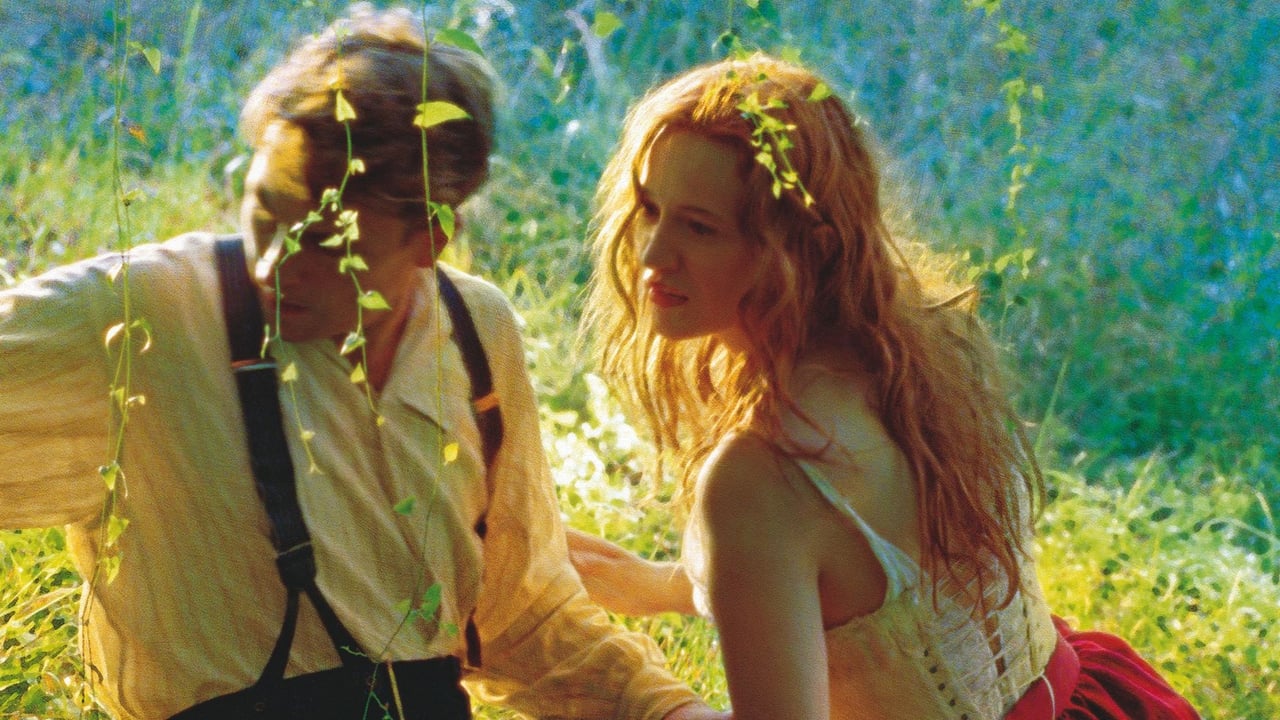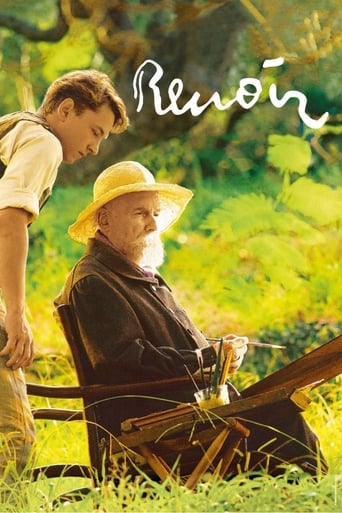

This movie is the proof that the world is becoming a sick and dumb place
... View MoreOne of the best movies of the year! Incredible from the beginning to the end.
... View MoreThis is a small, humorous movie in some ways, but it has a huge heart. What a nice experience.
... View MoreThe plot isn't so bad, but the pace of storytelling is too slow which makes people bored. Certain moments are so obvious and unnecessary for the main plot. I would've fast-forwarded those moments if it was an online streaming. The ending looks like implying a sequel, not sure if this movie will get one
... View MoreBeautifully photographed, the images manage to catch the essence of Renoir's use of color and light. In a way cinematographer Mark Ping Bing Lee is the real star of this film, creating at atmosphere that tells us more about the characters, and the Renoir's art than all the dialogue combined. I also loved the performance by Michel Bouquet - in his 80s as the film was shot -as the slowly dying Renoir, battling to continue his painting until the last. With simplicity and economy. his eyes and gestures let us feel some understanding of the man and his art. Additionally I appreciated the choice to just focus on a brief period near the end of Renoir's life, and his (platonic) relationship with his last muse, rather than the usual sprawling bio-pic approach. On the other hand, I wasn't enamored by the script (or at least the English translation on the subtitles) which kept reducing much of what is said by Renoir and those around him to easy and generic statements about art, pain, joy, creativity. If the images capture the richness of the man's work, the dialogue is often the Hallmark card opposite. Also, perhaps the most interesting part of the story, the return of Renoir's son Jean - who would go on to be one of the great film-makers of all time, from WW I, and his slow falling into romance with his father's muse Andree is jammed into the end of the film, and stays very much on the surface. You know something is amiss when the most emotion you feel in a film is at the cards just before the end credits summing up all the events you didn't see. It's too bad, because if the human stories (and ironically both generations of Renoir did work that was nothing if not about humanity) had matched the beauty of the images this seems like it could have been a great film -- instead of a beautiful but somewhat hollow and emotionally remote one. Still worth seeing, just frustrating.
... View MoreAnd to think I almost didn't see this film because of its ridiculously low IMDb rating. Are those now skewed by investment bankers, flash traders, and other impatient shills of Satan who find the pace of films like Renoir glacial? What a shame, if so. This film recounts and humanizes the final years of one of the world's most revered painters, one who rejected the title of artist. It is an Impressionistically rendered portrait (worth seeing for the Mediterranean light alone) that sparely and delicately portrays a cascade of relationships: between a father and a son 53 years younger, an arthritic painter who came to his métier in his fourth decade and a tempestuous adolescent model, the regenerative radiance of untrammeled eros, a love triangle, a female entourage who devotedly care for and carry le Patron wherever he will paint, a duty-bound WW I biplane pilot and a feisty fetishized lover, a latent filmmaker who here begins shedding his timorous, jejune indifference and later won international renown.It is a masterpiece, a visual, gustatory, and vocal feast, yet one from which music is mostly absent. A lingering, sequestered fin-de-siècle world from which war was mostly distant. A microcosm where vital energy in all its guises was evoked and honored. It prompts you to take in the light, the space, the nourishing gusts from the Mediterranean, the temperate, fertile verdure, the French cadences of early-20th-century rural France.Why so much talk among reviewers of abundant female "nudity" and "nakedness"? After a scene or two, it goes almost unnoticed, so naturally did it blend with the Edenic environs.The film is, perhaps above all, a condensed history of a family permeated by quiet genius and love of art and the arts. One somehow senses its origins and dénouements without being told of them.Renoir (the film) had deficits that others more critically competent than I have detailed. But it's tempting to begrudge Jacques Renoir, Gilles Bourdos and Jérôme Tonnerre the laconic textual bio of Andrée Heuschling (Christa Theret) that rolled by just before the credits. It asserted, not without Schadenfreude, that after her breakup with Jean Renoir in 1931 (not covered in the film), Andrée fell into a life of "obscure poverty".Yet no one actually knows what became of her. Could she not, for all we know, have bested Jean's fate? Might she have found her way to a Sardinian isle like the one where Lina Wertmüller shot Swept Away? A reclusive Impressionist may have offered to make a breezy, clothing-optional life with her in a cliff-side villa there (or so the sequel I'm planning has it). Only Heuschling, unlike Wertmüller's Raffaella, this time opted to stay put and leave the painted porcelain intact.
... View MoreThe relation between the painter and his model has seldom been questioned. Not much talk about man power. Quite few smiles about it. If it had been otherwise with female artists painting naked men, we don't know much about. It's not much of that sort in art history.We here meet the aging Renoir and one of his last models, Andrée. It becomes complicated when Renor's son appears. What's strongest? Art or sensual love?It could have been an interesting dilemma, if this had been more of a film and less of just pictures. The story is lost because of that. Neither questions nor answers.
... View MoreRenoir is a film about a person (the artist Renoir), his family, and his later life. Sorry, but there are no explosions, gun battles, or even a fist fight. The emphasis is on character and atmosphere. Thus there are scenes that seem to go nowhere, and conversations that don't seem to have significance. They are here, like the impressionist painter tries to convey a feeling. To this end, the film does very well. The viewer gets into the minds and hearts of the artist, his sons, and his model. Based mostly on fact, there of course may be some inaccuracies that may be discovered. but like an impressionistic painting, the mood is set, and the imagination does the rest.
... View More